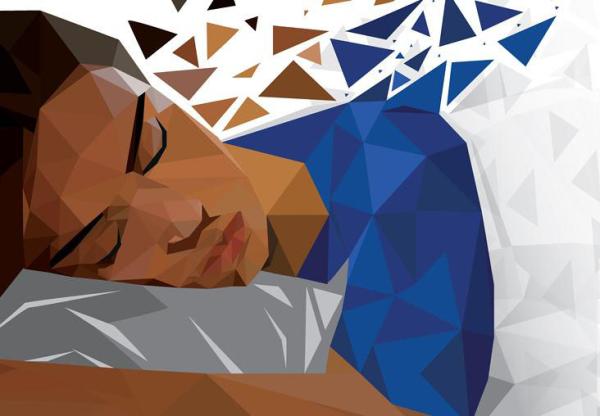Facing Daytime Discrimination Linked to Sleep Struggles
IRP Study Examines Overlooked Contributor to Racial Health Disparities

Sleep is essential for good health, and new IRP research suggests the stress of experiencing racial or ethnic discrimination can interfere with the ability to get a good night’s rest.
Recent news coverage of the deaths of George Floyd, Ahmaud Arbery, and Breonna Taylor, along with statistics reporting startlingly disproportionate death rates among black Americans infected with COVID-19, have made it clear that racial biases can be a matter of life and death. Meanwhile, it can be easy to overlook other, more subtle ways that discrimination can affect health, such as new IRP research that links instances of discrimination to poor sleep.1
While not immediately life-threatening, chronic sleep problems can have a substantial negative impact on a person’s health. Prior research suggests that poor sleep weakens the immune system, diminishes one’s ability to concentrate and recall information, and increases the risk of conditions such as obesity, type 2 diabetes, certain cancers, depression, and anxiety disorders. Moreover, many of the health issues linked to poor sleep occur at a higher rate in racial and ethnic minority groups, which has led scientists like IRP Stadtman investigator Chandra Jackson, Ph.D., to investigate whether racial discrimination could be contributing to these health disparities by interfering with sleep.
“Prior studies have suggested that discrimination can activate the body’s stress response system,” explains Dr. Jackson, the new study’s senior author. “During times of increased stress, it can be difficult to engage in adequate, good quality sleep. Therefore, discrimination can act as a social stressor that negatively affects sleep, which likely contributes to an increased risk of many sub-optimal health outcomes.”

Dr. Symielle Gaston, the new study's first author. Photo courtesy of Steve McCaw
The new IRP study, led by Dr. Jackson and IRP postdoctoral fellow Symielle Gaston, Ph.D., the paper’s first author, leveraged data from the Sister Study, a research effort organized by the National Institute of Environmental Health Sciences (NIEHS) that has recruited more than 50,000 American women whose sisters had been diagnosed with breast cancer. Dr. Jackson’s team looked at the association between poor sleep and two types of racial or ethnic discrimination: ‘everyday’ discrimination, which included experiences like being treated as less intelligent or being treated unfairly at a store or restaurant, and ‘major’ discrimination, encompassing more serious experiences like unfair treatment in home buying or renting, employment, or during interactions with the police.
More than three-quarters of the black women in the study, along with a third of Hispanic or Latina women, reported experiencing everyday discrimination. Half of the black participants reported major discrimination, and 48 percent had faced both forms of discrimination. Only 4 percent of non-Hispanic white participants reported experiencing everyday discrimination and only 2 percent had faced major discrimination. In addition, more than half of the black participants and a third of the Hispanic or Latina respondents slept fewer than seven hours per night, compared to a quarter of non-Hispanic white participants. This is less than the minimum amount of sleep that health experts recommend for adults.
After accounting for potential confounding factors in the analysis like socioeconomic status and health behaviors that tend to differ among different racial and ethnic groups, Dr. Jackson’s team found that women who experienced either form of discrimination were 10 percent more likely to report regularly getting fewer than seven hours of sleep per night. Among those who had faced both types of discrimination, the prevalence of insufficient sleep was 17 percent higher than for respondents who reported neither, and insomnia was 10 percent more common.

Dr. Chandra Jackson, the new study’s senior author.
“While it is currently difficult to estimate how big of an impact closing the ‘sleep gap’ would make in reducing racial and ethnic disparities in poor health, sleep is essential for maintaining health and well-being; therefore, it is logical that a reduction in sleep disparities would likely reduce persistent, commonly observed health disparities,” Dr. Jackson says.
The study provides strong evidence that discrimination is associated with disrupted sleep, but like most observational studies, it cannot prove a cause-and-effect relationship. Moreover, because most of the study’s participants were white and non-Hispanic, as well as more economically well-off than the average American woman, the new study may underestimate the prevalence of discrimination and poor sleep and the strength of the relationship between them. Nevertheless, the study presents a compelling public health rationale for improving anti-discrimination policies in a variety of settings.
“Our study cannot identify specific interventions since more research is needed; however, being treated as less intelligent, unfair renting and mortgaging practices, and unfair treatment by police had the strongest associations with sleep disturbances,” Dr. Jackson says. “As a result, those particular issues would be reasonable intervention targets. In addition to societal gains related to equitable housing practices and policing, such policies may also reduce sleep disturbances among racial and ethnic minority groups in the US.”
Subscribe to our weekly newsletter to stay up-to-date on the latest breakthroughs in the NIH Intramural Research Program.
References:
[1] Everyday and Major Experiences of Racial/Ethnic Discrimination and Sleep Health in a Multiethnic Population of U.S. Women: Findings From the Sister Study. Gaston SA, Feinstein L, Slopen N, Sandler DP, Williams DR, Jackson CL. Sleep Med. 2020 Mar 21;71: 97-105. doi: 10.1016/j.sleep.2020.03.010.
Related Blog Posts
This page was last updated on Wednesday, May 24, 2023
